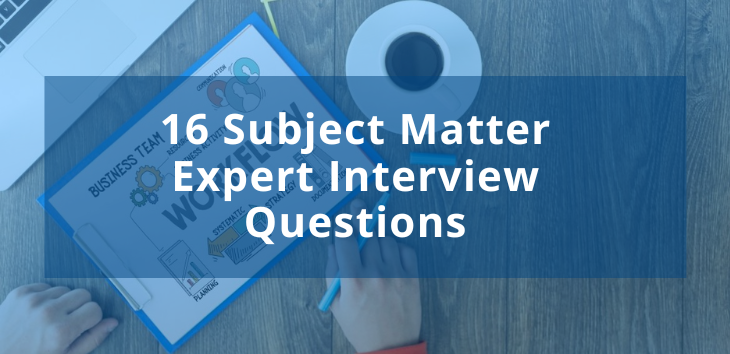
Do you know how to ask the right subject matter expert interview questions? Gone are the days when content was all about getting as many high-value keywords onto a page as possible or churning out backlinks through guest posts. Today’s search landscape is all about authority and expertise — something SMEs have in spades.
Readers want information they can trust, and Google wants to give it to them. In fact, Google’s manual raters specifically look for elements of experience, expertise, authoritativeness, and trustworthiness — the E-E-A-T guidelines — when evaluating page and website quality.
How do you use SMEs to insert this kind of credibility into your content? It requires getting a feel for their professional experience and discovering if it’s compatible with your niche market. We’ve prepared 16 targeted questions to guide your interview.
Preparing for the Interview
So, you know you need a SME to build authority and create content that tops the search results. But how do you go about finding prospective experts within your niche?
Identifying your ideal SME
Finding the ideal SME will depend on the type of content you’re providing, your goals, and what expertise is most valuable to your audience. Here are some valuable resources you can use to find these experts:
- Networking sites such as LinkedIn
- Professional associations
- Academic institutions
- Consulting firms
- Social media
- Industry publications
Pre-interview research essentials
Once you have a short list of business-relevant experts, be thorough during the selection process, as interviewing SMEs takes a lot of time and research. You want to avoid discovering halfway through the process that someone simply isn’t a good fit for your needs.
That’s where pre-interview research comes in. Do it right, and you’ll avoid headaches later. At the bare minimum, you should check the following details before approaching a SME for further discussion:
- Check audience alignment: Does the SME resonate well with your target audience? SMEs aren’t merely a source of knowledge. Just look at how science communicator Bill Nye enchants audiences — the right SME can turn an average article into high-ranking content filled with insights.
- Evaluate past work: Your SME should have a body of work you can examine. Read through their documents and listen to past public speaking engagements so you have a clear understanding of their experience and personality.
- Look for unique insights: A lot of web content is unoriginal or unhelpful — a problem Google seeks to fix with updates such as Helpful Content. SMEs who provide a unique perspective are a gold mine in today’s search landscape. As digital marketing pioneer Ann Handley says, “In a sea of mediocre content, a brave tone can be a big differentiator.”
Crafting Effective Subject Matter Expert Interview Questions
Eventually, you’ll need to interview your SMEs to explore the depth of their knowledge. However, there’s a right and wrong way to go about this.
For example, asking questions that yield simple yes or no answers won’t reveal much, so stick to open-ended questions when possible. You should also frame your questions neutrally if the potential for bias is a concern. Often, the best types of questions are the ones that prompt your SME to reveal personal or professional anecdotes, as this highlights the kind of personal experience and authority Google loves.
Sample SME interview questions by category
One of the easiest ways to plan your interview is by organizing questions into categories. Through these categories, you can learn more about an expert’s background, while leading the interview and staying on topic.
While it’s essential to adjust your questions based on the specific content and goals, the following list provides a solid foundation for most purposes.
Background and experience
1. What drew you to your field?
Discover what’s interesting about a specific subject through this question. This may help you tweak your content direction or learn ways to increase audience engagement.
2. Do you recall an experience that profoundly impacted your professional career?
Remember how Google prioritizes personal experience? Use this question to target Google’s E-E-A-T guidelines and meet its demand for helpful content.
3. What key lessons from your early career still influence your work today?
Learning about a subject’s foundational aspects allows you to provide relevant, valuable advice that remains evergreen.
Industry insights
4. What current trends do you find most influential in our industry?
Clean and simple — this question will empower you to make bold, accurate claims about the future of your industry, showcasing authority.
5. How do you see customer expectations or needs evolving in our industry?
In a 1989 interview with Inc. magazine, Steve Jobs said, “You can’t just ask customers what they want and then try to give that to them. By the time you get it built, they’ll want something new.” Your SME offers a unique perspective into customer psychology, so make sure you benefit from it.
6. What emerging technologies or methodologies excite you the most?
Want to provoke thought and fascinate your audience? Talking about future technologies is sure to do it.
7. What do you believe is the next big thing in our field?
This question lets you build trust in your audience by positioning yourself as an industry leader.
Challenges and solutions
8. What strategies do you use when confronted with challenges?
Use this question to insert practical advice into your content, improving its helpfulness.
9. Can you describe a complex issue you resolved that significantly impacted your company or industry?
Like some of our earlier recommendations, this question helps you add experience to your content. It can even lead you to valuable case studies.
10. How do you adapt problem-solving principles for interdisciplinary teams?
This question lets you add practical advice to your content to help your audience navigate collaboration — something crucial in most industries.
Personal philosophy and approaches
11. How do you stay motivated and focused in your field?
12. What approach do you take to manage your work-life balance?
13. How do you ensure continuous growth in your professional life?
Personal questions such as the ones listed above offer a unique opportunity to give your audience practical advice. This not only adds value to your content but also makes it more link-worthy, driving future growth.
Innovation and thought leadership
14. How do you cultivate a culture of innovation within your team or organization?
15. How do you see your role evolving as the industry changes?
16. What challenges do you face when introducing new ideas or changes in your industry?
These types of questions give you the information needed to craft compelling and useful leadership content. They target common pain points your audience may face, allowing you to provide the answers they seek.
During the Interview
SMEs are a wellspring of valuable insights and experience that can elevate your content and ensure that it’s helpful and engaging. However, getting to this information requires finesse.
Building rapport with SMEs
As an interviewer, it’s your job to steer the conversation in the right direction. Think of yourself as the ship’s captain. You need to navigate the vast ocean of information to find useful facts, quotes, and anecdotes.
Easier said than done, right? Well, follow these tips for a smoother interview.
- Organize things beforehand: Schedule a suitable time, choose the software you’ll use for the call, and let your expert see the questions in advance. Set up recording during the interview to ensure you have something to analyze later.
- Do your research: You can’t ask relevant questions if you don’t understand the subject. Learn as much as possible about the interview’s subject to ensure you can also ask useful follow-up questions.
- Establish common ground: Use mutual interests to build a connection with your SME and put them at ease. If you’ve had a similar experience, discuss it with them.
- Listen and acknowledge: Active listening is crucial to a good interview. Don’t just nod and agree — offer input to show you’ve understood everything and that you value the expert’s time and opinion.
- Maintain a conversational tone: A friendly, energetic tone and pace are ideal. While you need to stay on track, don’t be afraid to let your SME set the direction at times.
Mastering the art of follow-up questions
The other major challenge to a successful interview is the art of follow-up questions, knowing when and how to dive deeper.
Part of this goes back to a previous tip — doing your homework. But it’s also important to seek clarification if you don’t understand a concept. If you find something particularly insightful, build on your previous question to probe for more knowledge.
You can also approach follow-up in these targeted ways:
- Rephrase a question if the SME finds it difficult to answer.
- Ask for further information about any unfamiliar concepts or jargon.
- Ask about related topics to form links between separate ideas.
- Ask your SME to quantify or define anything ambiguous.
Post-Interview
Before you can incorporate insights from your SME into your content, you’ll need to analyze and refine the information you’ve gathered.
Analyzing SME insights
During the interview, it’s important to record everything said so you can transcribe and refer to it later. Then, approach the analysis.
- Highlight key points, including advice, predictions, and stories.
- Identify unique perspectives that competitors aren’t already leveraging.
- Sort all information based on categories such as industry trends and solutions to problems.
- Assess the information’s relevance for your audience.
- Determine where and how you can integrate insights into your content.
Refining and integrating interview findings
After analyzing the interview, there are many ways you can refine your content and integrate insights from your SME seamlessly:
- Use quotes: A quote is a powerful way to add authority to various kinds of content. Use direct quotes for impact or paraphrase your expert’s major points to support arguments and ideas in articles, videos, and social media posts.
- Condense information: SMEs have the professional experience to cover topics in great detail. It’s often necessary to summarize and simplify some concepts so your audience finds the information approachable and easy to understand.
- Add examples: Incorporate SME anecdotes into your content as real-life examples to illustrate complex points and make your content more relatable.
- Provide comparisons: Comparing your expert’s insights with other prominent figures balances your content. However, you can also use this technique to add contrast. For example, you can use your SME’s expertise to dispel a widespread myth.
SME Interviews: Enhancing Content Quality and Engagement
Experts bring extensive knowledge and unique experiences to the table, allowing you to position your business as an authority figure in the eyes of Google. They also help you craft engaging content that visitors will love to read from beginning to end.
However, you’ll miss out on these benefits if you don’t have a way to draw out the potential of your SMEs. That’s why you need methods to vet each expert and an interview process that gets to the heart of their expertise.If you need a professional to review your content, take a look at our SME services. We’ve vetted and verified each member of our network, giving you easy access to experienced professionals and streamlined content creation.
